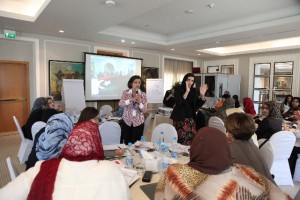Libyan women plan roles in reconciliation and transitional government
Posted on: April 27, 2012, by : Editor Over 40 Libyan women gathered in Cairo from October 7-9, 2011 to inaugurate the Libya Women’s Platform for Peace, a new national movement that will work together to increase all forms of female political participation in post-Gaddafi Libya.
Over 40 Libyan women gathered in Cairo from October 7-9, 2011 to inaugurate the Libya Women’s Platform for Peace, a new national movement that will work together to increase all forms of female political participation in post-Gaddafi Libya.
“I thought I was alone, but now I know I’m not,” said Amal Bugaighis, a lawyer and deputy president of the 17 February Coalition in Support of Women’s Decision-Making.
Facilitated by the regional Arab women’s NGO Karama, this meeting was the first of its kind in recent history, bringing together women from all regions of Libya, expatriates, diverse professional and social backgrounds, and members of older and younger generations.
“We brought them together to amplify the voices of Libyan women, to support, embrace and build on what they are already doing, said Hibaaq Osman, founder and CEO of Karama, the regional Arabic women’s NGO that convened the Cairo meeting.
During the three-day conference, participants conducted a dialogue on how best to promote peace and reconciliation during the transition period, and discussed what constitutional provisions would be necessary to secure democracy and a robust role for women in the new political environment.
“Through the Libyan Women’s Platform for Peace, Libyan women at home and of diaspora, from the East, the West and the South, of Arab and Berber origin, have come together for the first time to share their experiences of pain from Gaddafi’s barbaric dictatorship. Libyan women have also identified a set of values such as dignity, freedom, justice, and peace to uphold in the new Libya. Finally we Libyan women have come together to announce the emergence of a new movement “The Platform of Libyan Women for Peace” which will work on capacity building of active women in five major areas: media, education, legislation and the constitution, political participation, and violence against women,” said Zahra’ Langhi, Libyan activist and member of the Peace Platform.
In coming weeks, the participants will hold follow-up meetings in key Libyan cities to engage local stakeholders in these discussions, and to further strengthen the pan-Libyan women’s movement that has emerged.
“This was an historical moment for Libya women. This meeting has revealed the strength of Libyan women which has been buried for long. Through the Platform of Libyan Women for Peace, Libyan women has shown their determination to rebuild Libya,” said Hanaa El-Hibshi [Numedia], a participant and 26 year old political activist from Tripoli.
During the strategy session, the Libya Women’s Platform for Peace initiated a connection with key members of the international community active in Libya policy, including the European Union and the OSCE.
In co-operation with international partners, the Peace Platform members drafted a statement and set of Libya policy recommendations, that was forwarded to, and adopted by the OSCE.
“The Arab region is the last region in the world to have risen against dictators, after Asia, Latin America and Europe and it was indeed time for the region to do so. The revolution – that was led by women just as much as it was led by men – was in part a revolution against paternalism, whether the father figure of the head of state, or paternalism within the family,” said Marc Franco, the European Union ambassador to Egypt, speaking to meeting participants.
For more information or to arrange an interview with one of the participants, please contact Zahra Radwan at +20 17 352 3528 or zahra@el-karama.org
Image courtesy of Dominique Margot
